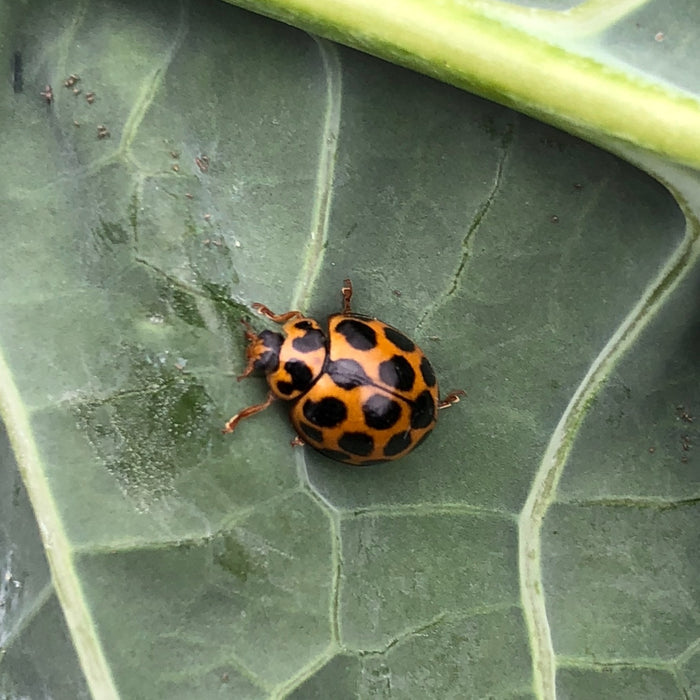
Bugs for Bugs Spotted ladybird
Note: No Bugs for Bugs orders will be despatched between 17-26 December. Limited orders will be despatched from 29 December, with full operations resuming 5 January 2026.
!!PLEASE NOTE THERE IS A $85 QUARANTINE INSPECTION FEE + SHIPPING FOR ALL BUGS FOR BUGS ORDERS TO WESTERN AUSTRALIA!!
Description
Harmonia conformis
This native Australian ladybird beetle is an entirely new biocontrol product. Bugs for Bugs is excited to make this attractive beetle available for targeted treatment of aphid infestations. The application of this biocontrol agent is still in the research and development stage, but where they have been observed in the field they have proven themselves to be ferocious aphid predators and we are optimistic about the potential for this organisms to be utilised to treat aphid infestations in a wide range of crop environments.
Both adults and larvae feed on aphids, however the bulk of the predation is done by the larvae. Adults have alternative food sources such as nectar and pollen and so they are less dependent on aphids (or similar soft-bodied prey). They can survive when pests are at low levels in the crop, and will search out food for their offspring, laying their eggs amongst colonies of suitable prey.
Key target pests
- Aphids
- Psyllids
Suitable crops/environments
Harmonia ladybird beetles have the potential to be employed for aphid control in a wide range of crop environments including tree crops, vegetables and ornamentals, in both field and protected situations. At this stage we have only limited experience applying this species as introduced biocontrol agents in the field and we cannot guarantee results in any particular crop. We are very keen to receive customer feedback on the performance of this predator in different situations, so please share your experience with us.
At release
Adult beetles are supplied in packs of 30. At point of sale they are already sexually mature, ready to feed on aphids upon release and also lay eggs in the crop to kick start the next generation of hungry larvae! The beetles should be released as soon as possible after arrival. Release onto plant foliage near aphid infestations by gently tapping them out of the container. In the event of adverse weather such as extreme heat or high rainfall, they may be stored for several days before release. This is best done in a dark place at about 17°C. During storage, adult beetles should be given a top up of honey (placed on the inside of the container lid) if the original supply has already been consumed.
Spotted ladybird eggs are supplied in packs of 150 (or more). These eggs may be divided into several seperate containers to minimise the risk of cannibalism once the larvae emerge. The eggs will hatch in transit or shortly after arrival. A small amount of food (sterilised moth eggs) is provided for the ladybird larvae to feed on when they emerge, but the longer they remain confined in a container the greater the risk of cannibalism. Once the eggs have hatched and the tiny black ladybird larvae are visible in the containers it is time to release them – gently tap the contents of each container onto pest-infested plant material. It is important that you find pest hotspots to release the larvae into, because if they don’t immediately find pests to feed on they will begin to eat each other or perish.
